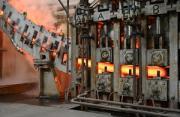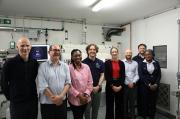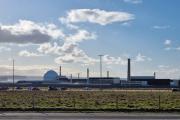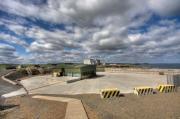
This site uses cookies, by continuing to use this site you accept the terms of our privacy policy
Feed 2.0 Loading...
Warning Signs Removed From Sandside Beach As Perceived Particles Threat Lessened
7th December 2006
The third report of the Dounreay Particles Advisory Group states that the possibility of coming into direct contact with a particle at Sandside is extremely small and would not cause any discernable health effect.
As a result existing signs, which were erected by the estate, were removed at the weekend by the estate of its own choice. Following this Sandside Estate invited UKAEA to enter preliminary discussions about new signs to provide current information to the public. These initial discussions have now taken place.
Sandside Estate offered to discuss in conjunction with UKAEA the need, wording and positioning of future signage at Sandside with the Highland Council, SEPA and Highland Health Board subject to a speedy decision.
Phil Cartwright, Land Remediation and Particles Project Manager said "We are pleased to work with the owners of Sandside Estate and will also involve the key agencies to arrive at suitable wording for new signage which provides current information on this issue to the public"
Mr Minter owner of Sandside Estate said today "We do still have damage occurring to our land but that is not part of the public health issue which is what our old signs were to protect. I believe we have handled the signage responsibly especially given our duty of care. Our signs were erected on legal advice and worded on expert advice - they were temporary and precautionary until an official opinion was (belatedly) declared. When
at last the risk of harm from the particles of the radioactivity detected at Sandside so far, was officially declared minimal by DPAG, the placement of our signs became unnecessary so I ordered them to be removed straightaway. Regard must be had for the wording used by the key agencies at Dunnet Bay where only one very minor particle has been found".
Particles were generated during the dismantling and preparation for reprocessing at Dounreay of spent nuclear fuel. There is evidence of some of these particles entering the drainage systems at Dounreay and being discharged to sea.
A report was released by DPAG in November 2006 which provides their latest thinking on this issue. See Here
Restrictions on fishing are in place in this area.
UKAEA is carrying out a study to determine if there is a better option to reduce the risk from particles than just the current strategy of monitoring beaches. As part of this, full public consultation on the options is scheduled for early 2007.
See Here
Related Businesses
Related Articles
10/1/2025
Fusion-grade Steel Produced At Scale In UK-first
Researchers achieve 10x production cost savings for reduced activation steel. A United Kingdom Atomic Energy Authority (UKAEA) working group has successfully demonstrated the industrial scale production of fusion-grade steel.
22/12/2024
UKAEA To Lead The Creation Of A Robotics And AI Cluster
UKAEA will lead the creation of a new £4.9m nuclear robotics and artificial intelligence cluster across Cumbria and Oxfordshire. The robotics and AI cluster was announced by UK Research and Innovation (UKRI) as one of seven new projects to kickstart economic growth and address regional needs: www.ukri.org The robotics and AI cluster will link Cumbria and Oxfordshire to accelerate the decommissioning of the UK's legacy nuclear fission facilities and keep people out of hazardous environments.
5/12/2024
Diamonds Are Forever? World-first Carbon-14 Diamond Battery Made In Uk
The world's first carbon-14 diamond has been produced with the potential to provide power for thousands of years. Scientists and engineers from the UK Atomic Energy Authority (UKAEA) and the University of Bristol have successfully created the world's first carbon-14 diamond battery.
4/11/2024
UKAEA Monthly Newsletter Latest Edition
Find out what has been happening at UKAEA in our monthly newsletter. Read about our recent activities and upcoming events.
1/10/2024
UKAEA Newsletter - Edition 11 Published Today
Find out what has been happening at UKAEA in our monthly newsletter. Read about our recent activities and upcoming events.
23/5/2024
Corwm Visits Dounreay Nuclear Site
Members were given an overview of the scale of the problem and challenges faced in the decommissioning of the site. In the last week of March 2024, several members of CoRWM led by the Chair, Sir Nigel Thrift, made the long journey up to the North of Scotland to visit the Dounreay nuclear site, now managed by Nuclear Restoration Services.
5/3/2021
Design Contract Awarded For Dounreay Shaft And Silo Work
Dounreay has awarded an important waste clean-up contract to Jacobs as the site plans for the future of its deepest historic radioactive waste store. Jacobs and its supporting partners have been awarded a 6-year contract to provide a design management team to produce a fully integrated design for the shaft and silo project.
6/11/2013
Radiation dose to public from Dounreay reduces
Dounreay�s radioactive impact on the environment continues to fall, according to a report. The annual survey report �Radioactivity in Food and the Environment� (RIFE 2012) has recently been published and it can be read here - http://www.sepa.org.uk/radioactive_substances/publications/rife_reports.aspx The report uses data obtained from samples of air, fresh water, grass, soil, and locally sourced meat, fish, milk and vegetables during 2012.
6/4/2012
57,000 Tonnes Of Hazardous Materials Finally Dealt With At Dounreay
Dounreay today completed the destruction of one of the most hazardous legacies of Britain's earliest atomic research. A purpose-built chemical plant processed the last of 57,000 litres of liquid metal lifted from the primary cooling circuit of the experimental fast breeder reactor.24/3/2011



